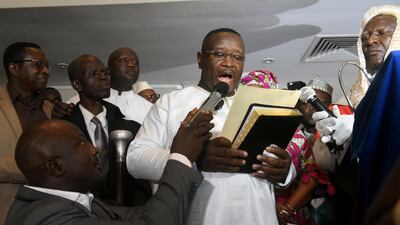With powerful Chinese backing, Samura Kamara, the presidential aspirant of Sierra Leone’s ruling All People's Congress, was quietly confident ahead of last month’s presidential run-off.
But instead it was Julius Maada Bio of the rival Sierra Leone People's Party who was sworn in as the country’s president late on Wednesday night, concluding a controversial election in the troubled west African nation.
“This is the dawn of a new era,” he said, following the short ceremony. “The people of this great nation have voted to take a new direction.”
Disputes between the two parties over tallying had for a week delayed the result, which Mr Kamara plans to challenge in court.
Though ethnic rifts run deep in a country still recovering from a harrowing 11-year civil war, the election – the second transfer of power between parties since 2002 – was largely peaceful.
“The election marks a significant step towards consolidating democracy in Sierra Leone,” said Ben Payton, head of Africa at Verisk Maplecroft.
Mr Bio, 53, who led a three-month junta government in 1996, won 51.8 per cent of the vote, ending the APC’s decade in power. He takes over from Ernest Bai Koroma, who defeated him in the 2012 elections.
He now faces the unenviable task of tackling endemic corruption and rejuvenating an economy that has nosedived in recent years amid a global commodities crash and a 2014 Ebola outbreak that left 4,000 dead.
Despite vast mineral reserves, Sierra Leone is among the world’s poorest nations, heavily dependent on foreign aid. When a mudslide in the capital, Freetown, killed 500 last year, the country’s poor medical infrastructure was laid bare.
Mr Bio’s campaign promise of free universal education will be hard to deliver, particularly as the APC has retained control of the country’s parliament.
_______________
Read more:
Sierra Leoneans hope for an economic turnaround as they elect new leader
Sierra Leone's Peace Diamond: how the gem made its way from mud to marketplace
______________
With 16 candidates on the initial ballot the election was unusually open. But it was a major international player that caused the most debate, after footage emerged in January of Chinese men campaigning with APC candidates.
Mr Kamara – hand-picked by the outgoing president – has been a fervent advocate of Chinese investment. Meanwhile Mr Bio criticised it as a “sham with no economic and development benefits to the people”, gaining traction with voters. “They likely wanted a different direction, and voted that way,” said Catherine Bolten, professor of anthropology at Notre Dame University.
Amid allegations that Chinese companies had financed his campaign, supporters of Mr Kamara were filmed chanting “we are China”.
Chinese companies own Sierra Leone’s largest iron ore concession. They have built a $115m toll road and the APC headquarters in the capital, Freetown and invested across Sierra Leone’s markets, from fisheries to health care.
The controversial Mamamah airport is being built by the China Railway Seventh Group, with funds from Chinese Exim Bank. Currently under construction at a cost of $300m (Dh422.3 million), it has been roundly criticised by international lenders like the International Monetary Fund and the World Bank, who view it as an unnecessary burden on an impoverished nation.
Chinese companies generally bring their own native workforce and provide scant local employment opportunities.
“It is true that Mr Bio gained political capital by campaigning against Chinese influence, although it is very hard to say whether this actually counter-acted the support the Chinese allegedly gave to the APC,” said Mr Payton.
Whether Mr Bio will continue his belligerence in office remains to be seen. “The government is in need of financial support and in the last decade China has been a very willing lender,” said Jamie Hitchen, Director of AREA Consulting.
Yet while transformation may be mild, its implications are important as China extends its influence in Africa. “The SLPP is still business as usual,” said Ms Bolten. “But it did reveal that hitching one's wagon to a foreign power is no guarantee of success.”

